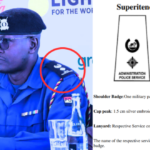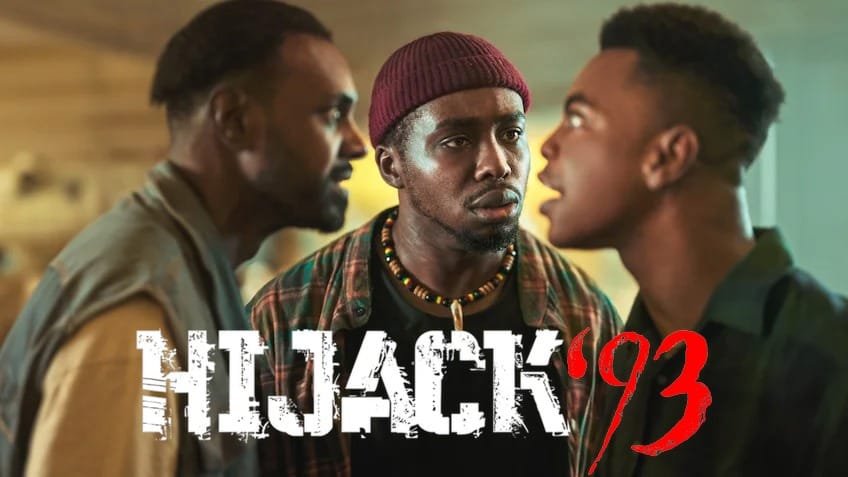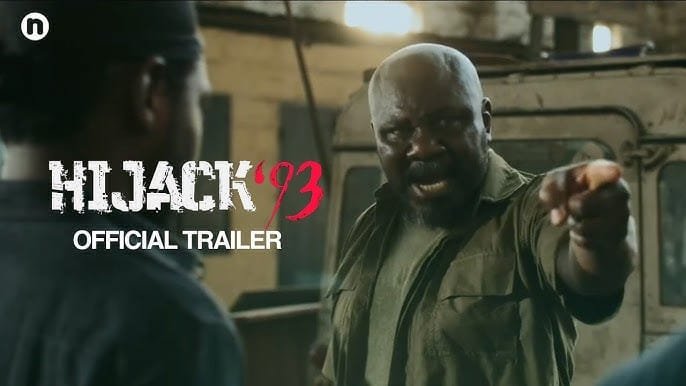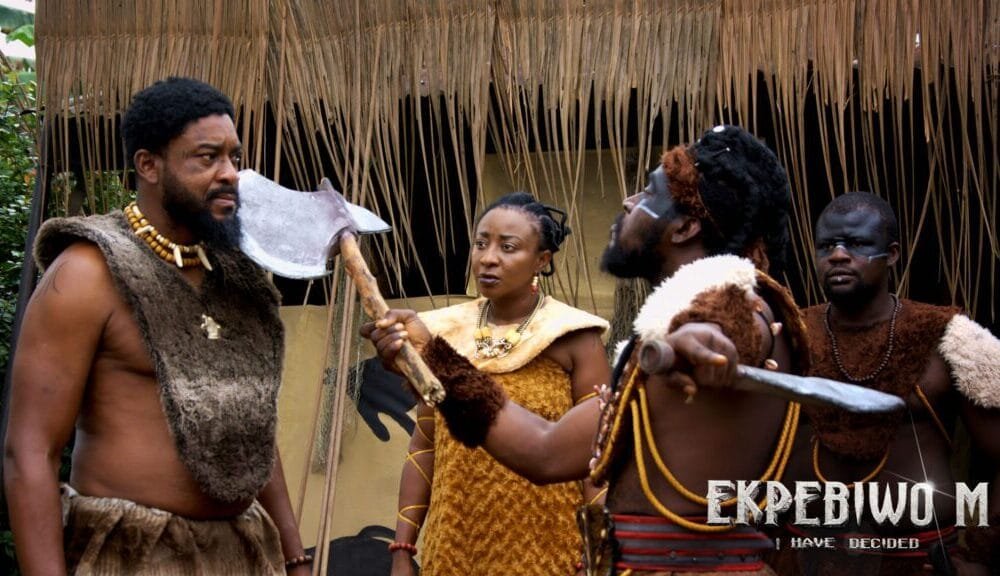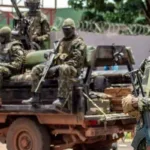A Play Network Studios production, in collaboration with Native Media, presents a fictional interpretation of the events surrounding the 1993 airplane hijacking in Lagos, Nigeria. Directed by Robert Peters, Hijack ‘93 follows four men who, in their quest to dismantle a military-backed government, seize control of an aircraft, using the passengers as leverage for social change. Hijack ’93 is currently streaming on Netflix.
Plot
In 1993 Lagos, a figure known as ‘Teacher‘, endeavours to motivate young men, encouraging them to confront the oppression in their country. He selects four individuals for a critical mission. The subsequent scene unfolds at the airport, where these men are among the passengers boarding a plane. Before departure, one of the men, Owiwi, discreetly conceals a firearm in the restroom, and just before takeoff, a government official boards the Nigerian Airways flight.
Once the aircraft has taken off, the four individuals hijack the plane, threatening to pour petrol on the passengers if they do not comply with their demands. Alarmed by the situation, the pilots attempt to land the plane, but the hijackers insist that it continue flying.
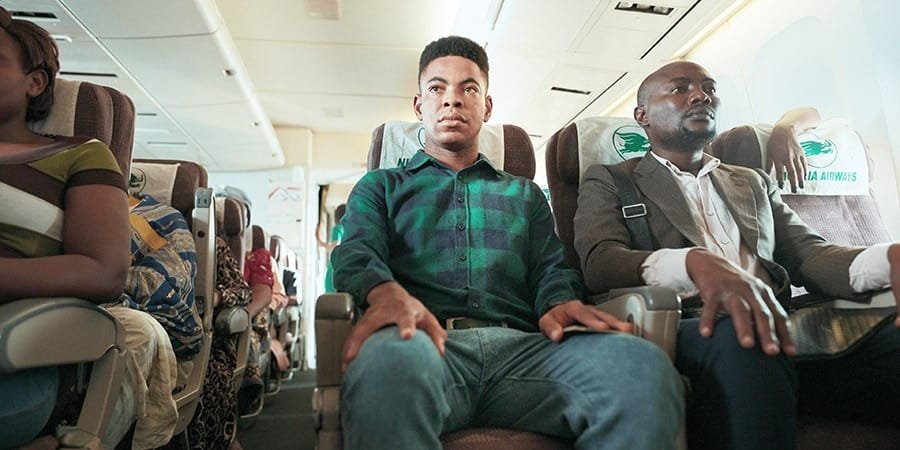
The leader of the four-man crew then addresses the passengers, announcing that they are members of the Movement for the Advancement of Democracy. They demand an end to the oppressive regime that has misappropriated the nation’s wealth for the benefit of a privileged few. They call for the reinstatement of the democratically elected president within 72 hours, with the ultimate objective of landing the plane in Frankfurt.
When the plane runs out of fuel, the passengers and crew face a dire situation. With no viable options for landing due to Nigerian airspace restrictions, turning back isn’t feasible. The boys are left with a grim choice: either land or crash. Desperate to avoid the latter, they demand land clearance. When no authority relents, Skipper threatens one of the pilots, ultimately forcing them to land without permission.
Upon landing, the National Gendarmerie of Niger is already awaiting them on the tarmac. To prepare for potential violence, the boys douse the passengers in gasoline, warning that if the military attacks, they will set the plane ablaze. Given Niger’s French-speaking environment, an interpreter is required for negotiations. During tense discussions, Owiwi, one of the leaders, threatens to kill the passengers, while Captain Gana attempts to de-escalate by insisting the passengers are not Nigeriens. However, Owiwi’s actions portray the group as terrorists, unsettling their ranks.
Amid the chaos, disorder erupts within the boys’ camp as Owiwi’s rash behaviour drives the group to a breaking point. Soon, the Nigerian Army arrives, and it’s revealed that Lee Zhang, the son of the Chinese ambassador to Nigeria, is among the passengers. Meanwhile, soldiers discover the hideout of a key organiser, Teacher, who attempts to flee with his crew.
On the second day, a fuel truck arrives, but it provides just enough fuel to power lights and air conditioning, not for further flight. Captain Dokumbo steps forward to negotiate the release of ten passengers, leveraging the threat that their families are in custody if they don’t comply. He tries to rally support from the passengers to back their demands, but only Lee Zhang stands with them. Zhang’s safety became a priority for the Nigerian Army.
Suspicions arise among the pilots, who begin discreetly investigating a possible insider within the cabin crew. Tensions escalate as Lee Zhang falls ill with a severe fever, requiring medical attention. Unwilling to let go of their only leverage, the boys refuse aid. Amidst mounting pressure, Iku starts to have a change of heart, realising the mission has failed. By the third day, they agree to release some passengers, including Zhang, though it is later revealed that the captain had poisoned Zhang’s food to prompt his release.
Frustrated, the boys hatch a new plan: they offer to release the remaining passengers if they are granted a reputable journalist to tell their story and if they can face trial in Niger instead of Nigeria. Owiwi, however, deviates from the plan, pouring gasoline over the passengers and shooting the interpreter. This act spurs the military to move in, ultimately rescuing the passengers and capturing the boys.
Captain Dokumbo insists on taking the boys back to Nigeria, but the Nigerien captain refuses. Amid the aftermath, the cabin crew identifies an insider, but Ada, the real infiltrator, frames someone else to cover her tracks. Meanwhile, the Teacher’s whereabouts remain unknown.
Cast
The ensemble cast of Hijack ’93 featured Adam Garba, Nnamdi Agbo, Akinsola Oluwaseyi, Allison Emmanuel, Nancy Isime, Sharon Ooja, Efa Iwara, John Dumelo, Jemima Osunde, Ego Nwosu, Bob Manuel, Jessica Lorraine, and many others.
Language
English was the predominant language, and Pidgin was occasionally used.
Final take
Hijack ’93 attempts to dramatise the real-life hijacking of a Nigerian Airways flight from Lagos to Abuja in 1993. However, when it comes to true-life events, accuracy is crucial; if a story cannot be told authentically, it risks misrepresenting history. This film, unfortunately, falls short of capturing the essential details that would bring this dramatic event to life, missing key elements in setting, costume, language, and character portrayal that are vital for an effective historical drama.
Despite the inherent intensity of the story, Hijack ’93 lacks depth, leaving viewers struggling to connect with the plot. The absence of a compelling backstory for the hijackers makes it difficult to understand their motives, resulting in a disjointed narrative that fails to engage the audience. This disconnect is compounded by inaccuracies, such as misidentifying the key hostage as the son of the Chinese ambassador rather than the actual figure, Rong Yiren, who was then the Vice President of China.
Ultimately, Hijack ’93 suffers from a lack of intentionality in its execution, missing the mark on conveying both the emotional weight and historical significance of the events it sought to portray.


